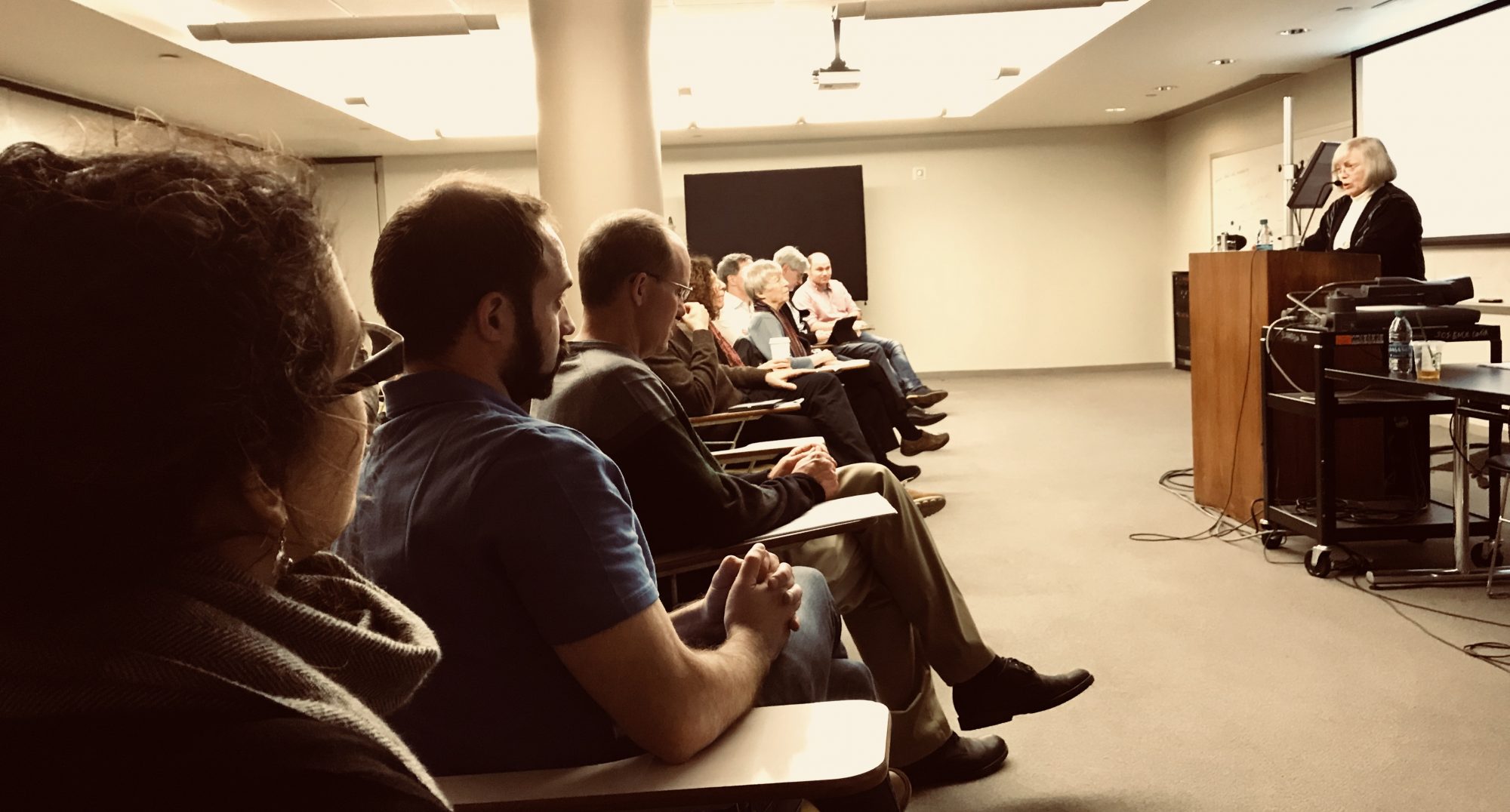 (PhD Columbia, 1981; Prof) Medical anthropology; contemporary United States studies, urban, political economy, gender; Southern Africa (isusser@hunter.cuny.edu)
(PhD Columbia, 1981; Prof) Medical anthropology; contemporary United States studies, urban, political economy, gender; Southern Africa (isusser@hunter.cuny.edu)
Her latest publication: Updated Norman Street:Poverty and Politics in an Urban Neighborhood (Oxford University Press 2012) features a new section:
Claiming a Right to New York City which discusses the changing neighborhoods of Greenpoint and Williamsburg in Brooklyn from the original ethnography which began with the New York City fiscal crisis and the occupation of the People’s Firehouse in 1975 to the Occupy movement of 2011.
The original edition of this book (Oxford 1982) explores working class consciousness, racism, ethnic identities and gender in the emergence of social movements in Greenpoint- Williamsburg Brooklyn sparked by the New York City fiscal crisis of 1975, as the first neoliberal experiment.
Based on thirty years of research in New York City with respect to poverty and homelessness as well as interdisciplinary theoretical approaches to urbanism, the book draws on the concept of the Wounded City, first outlined by Susser and Schneider in their edited volume, Wounded Cities (Berg 2003) to demonstrate the way in which assaults on a city, such as the tragedy of 9/11 or the 2008 Great Recession, open up channels for major corporate interventions which can more easily bypass democratic questioning under such shocking conditions (similar to Naomi Klein’s “Shock Doctrine” published in 2007) The book documents the displacement of the Latino/a population through gentrification over the past decades as well as the collaboration of artists, actors, dancers, theater directors, writers and working class people in mobilizing to improve environmental and living conditions. However, it shows the ways in which all these groups were threatened in the rezoning process instigated by Mayor Bloomberg in 2001 to attract major corporate investors and an upscale international elite. The Updated edition follows the battle to save the affordable housing, diverse population, parks, swimming pool and accessible riverfront views which the community organizations had helped to create.
Susser argues that we need to reconsider the role of “cultural workers” such as the artists, actors and others of Williamsburg. Clearly, as many analysts have argued, such cultural workers are the harbingers and facilitators of “revitalization” and gentrification. However, they, too, were early displaced from previous centers such as Greenwich Village and Lower East Side and recognizing the writing on the wall in the new Brooklyn neighborhoods, many joined with working class movements to preserve their living spaces in Greenpoint and Williamsburg. This book demonstrates the longterm struggles of community organizations to construct affordable living conditions with parks, decent schools and other facilities for poor and middle class people and documents both their viability over decades as well as the enormous forces they have had to contend with over the past decade.
Her other most recent book is AIDS, Sex and Culture: Global Politics and Survival in Southern Africa (Wiley-Blackwell 2009) which was awarded the Eileen Basker Memorial Prize for research in women and health, by the Society for Medical Anthropology (2012)
AIDS, Sex and Culture: Global Politics and Survival in Southern Africa (Wiley Blackwell) draws on medical anthropology, science studies, global studies, as well as research on class, gender and race. It discusses the ways in which women mobilized, from small group meetings to major demonstrations, to prevent AIDS in Southern Africa and how these social movements could be understood in their local, national and global context. Following the methods of extended case analysis, the work considers the gendered framing of scientific research in the United States as well as at the global scale and the ways in which this affected the available funding and preventive methods in Southern Africa as well as the national and local political arenas framing AIDS prevention and treatment. In part it is a study of the historical emergence of a national movement for AIDS treatment in the context of the immediate transition from apartheid in South Africa.
The book documents the shifts in the political arena as the deaths from AIDS multiply in the face of silences about the disease at all scales. The book outlines the interaction between denialism by political officials at the national level and the emergence of strong protest movements among men and women who began to recognize the massive numbers of people dying of AIDS and the practical implications of the denialist policy at the local level and ultimately were successful in changing AIDS policy in South Africa.
Susser goes beyond the political battles in South Africa to demonstrate contrasting experiences among the San peoples of Namibia and the ways in which a history of foraging and egalitarianism shaped women’s mobilization around AIDS prevention in the modern state of Namibia. Susser’s research illuminates the role of grassroots intellectuals as the mediators of knowledge and praxis from the local to the national and the global as well as from the global to the local.
Honors, Grants, and Awards
- National Endowment for the Humanities Fellowship and National Institute of Health Fellowship, “From the Cosmopolitan to the Personal: Cultural Conceptions of Gender and Sexuality in the Battle Against HIV/AIDS,” 2002.
- Prize for Distinguished Achievement in the Critical Study of North America, from the Society for the Study of North America (SANA) of the American Anthropological Association, 2001.
- MacArthur Research and Writing Fellowship for Spaces of Autonomy: Defining Sustainable Strategies to Combat HIV/AIDS in sub-Saharan Africa, 2001.
- Annual Awards from the Fogarty Foundation for Anthropological Research and Training Concerning HIV Prevention in Namibia (with Richard Lee), 1995 – present.
PUBLICATIONS
Books
| 2011 | Norman Street Revisited: Claiming a Right to New York City |
| New York: Oxford University Press (in press). | |
| 2009 | AIDS, Sex and Culture: Global Politics and Survival in a Southern Africa |
| Oxford: Wiley-Blackwell Publications. | |
| 2003 | Medical Anthropology in the World System, 2nd Edition |
| (with Hans Baer and Merrill Singer) | |
| Westport: Praeger Publishers. | |
| 1982 | Norman Street: Poverty and Politics in an Urban Neighborhood |
| New York: Oxford University Press. |
Edited Books
| 2009 | Rethinking America: The Imperial Homeland in the 21st Century |
| (with Jeff Maskovsky) | |
| Boulder: Paradigm Press. | |
| 2003 | Wounded Cities: Destruction and Reconstruction in a Globalized World |
| (with Jane Schneider) | |
| Berg. | |
| 2001 | The Castells Reader on Cities and Social Theory |
| Oxford: Blackwell Publishers. | |
| 2001 | Cultural Diversity in the Anthropology of the United States: |
| A Critical Reader | |
| (with Thomas Patterson) | |
| Sponsored by the American Anthropological Association | |
| Oxford: Blackwell Publishers. | |
| 1997 | The Anthropology of AIDS in Africa and the Caribbean |
| (with George Bond, John Kreniske and Joan Vincent) | |
| Boulder: Westview Press. |
Selected Articles and Book Chapters
| 2010 | “The Anthropologist as Social Critic: Working Toward a More Engaged |
| Anthropology” In Current Anthropology volume 51, S2, April 2010 | |
| 2008 | “Women in the Time of AIDS: Barriers, Bargains and Benefits” in AIDS |
| Education and Prevention, 20 (2) pp. 91-106 (with J. Mantell and Z. Stein) | |
| 2007 | “Women and AIDS in the Second Millenium” in Women Studies Quarterly 35 |
| (1,2). Pp. 336-344 | |
| 2007 | “Confounding Conventional Wisdom: The Ju’/hoansi and HIV/AIDS” (with |
| Richard Lee) in Updating the San: Image and Reality of an African People in the | |
| 21st Century. Eds, R. Hitchcock, et al., Senri Ethnological Series no. 70, | |
| National Museum of Ethnology, Osaka, Japan. Pp.45-61 | |
| 2006 | “Working Class Struggles in New York City: from the neighborhood to the |
| homeless shelter” in Rome and New York City: Comparative Urban Problems at | |
| the End of the 20th Century. Eds. Victor Goldsmith and Eugenio Sonnino, | |
| Casa Editrice Universita, La Sapienza. Pp.151-171 | |
| 2006 | “Castells: The City and the Grassroots: an anthropological perspective,” |
| International Journal of Urban and Regional Planning, 30(1). Pp. 212-218 | |
| 2004 | “From the Cosmopolitan to the Personal: women’s mobilization with respect |
| to HIV/AIDS” in Social Movements, Ed. June Nash. Blackwell Publishers. | |
| Pp.272-284 | |
| 2003 | “Ju/’hoansi Survival in the face of HIV: questions of poverty and gender” in |
| Anthropologica 45. Pp.121-128 | |
| 2002 | “Losing Ground: Advancing Capitalism and the Relocation of Working Class |
| Communities” in Locating Capitalism in Time and Space: Global Restructurings, | |
| Politics, and Identity, David Nugent (Ed.). Stanford University Press. Pp. 274- | |
| 289 | |
| 2002 | “The Health Rights of Women in the Age of AIDS” in the International Journal |
| of Epidemiology, 31. Pp. 45-48 | |
| 2001 | “Sexual Negotiations in relation to Political Mobilization: the prevention of |
| HIV in comparative context” in The Journal of AIDS and Behavior. June 5(2). | |
| Pp. 163-172 | |
| 2000 | “Culture,Sexuality and Women’s Agency in the Prevention of HIV/AIDS in |
| Southern Africa” with Zena Stein, in American Journal of Public Health, July | |
| 90(7) Pp. 1042-1049 | |
| 1999 | “Inequality, Violence and Gender Relations in a Global City: New York, 1986- |
| 96” in special issue on “Gendered Violence,” Mary Anglin (ed.). Identities: | |
| Global Studies in Culture and Power 5(2). Pp. 219-248 | |
| 1997 | “The Flexible Woman: Regendering Labor in the Informational Society,” |
| Critique of Anthropology 17(4). Pp. 389-402 | |
| 1996 | “The Construction of Poverty and Homelessness in U.S. Cities,” Annual |
| Reviews in Anthropology 25. Pp. 411-435 | |
| 1993 | “Creating Family Forms: The exclusion of men and teenage boys from |
| families in the New York City shelter system, 1987-91,” Critique of | |
| Anthropology 13(3). Pp. 267-283 | |
| 1991 | “The Separation of Mothers and Children” in John Mollenkopf and Manuel |
| Castells. The Dual City. New York: Russell Sage Foundation. |



